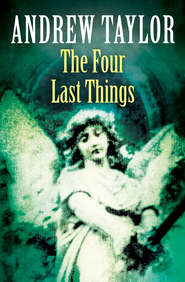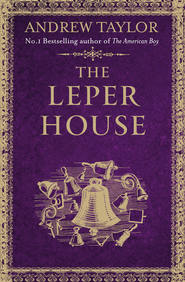По всем вопросам обращайтесь на: info@litportal.ru
(©) 2003-2024.
✖
The American Boy
Автор
Год написания книги
2019
Настройки чтения
Размер шрифта
Высота строк
Поля
‘Mr Frant is dead?’ I blurted out.
‘That is the question,’ Grout said. ‘The watchman believes the body is Mr Frant’s. But he met him only once, and that briefly, and he cannot be said to be a reliable witness at the best of times. At such short notice I have been able to find no one in the vicinity who knows Mr Frant. But I understand that he has – had, that is to say – a boy at the school, so I have driven over to see whether someone was able to identify the body; or not, of course, as the case may be. Mr Bransby tells me he has never met Mr Frant either, but that you have.’
‘Yes, sir, on several occasions. Tell me, what of Mrs Frant? Has she been informed?’
Grout shook his head. ‘It is a delicate matter. One would not like to tell a lady that her husband had been murdered, only to discover that the victim was in fact somebody else. Mr Bransby tells me you have been a soldier, sir, that you were in fact one of our glorious army at Waterloo. I hope I am correct in inferring that the sight of a man who has died a violent death may have fewer terrors for you than it would for a mere civilian.’
There was a glazed expression on Mr Bransby’s face. He gave me a tight smile and nodded. I knew I had little choice but to accept the rôle that he had allotted me.
Mr Grout bowed to my employer. ‘Mr Shield should be back in time for dinner.’
‘Well, the sooner this is done the better.’ Bransby fixed me with a glare. ‘We can only hope and pray that the unfortunate man does not prove to be Mr Frant.’
A few minutes later, Mr Grout and I were driving briskly away in his whiskey. We rattled down Church-street and turned right into the High-street. It was on this road, not very far south from here, that I had met Mr Frant for the first time – in September, when I had walked to Stoke Newington to take up my situation at Mr Bransby’s school. I remembered the meeting well enough – as one does when a man more or less threatens to set his servants on one – but he had never shown the slightest recollection of it. It occurred to me that now I had a possible explanation for his presence on the road that day, one that perhaps also accounted for Mr Frant’s bad temper: he had been inspecting one of his failing investments.
We turned into a narrow lane between tall hedges. As we bounced and slithered along on a surface of rutted, frozen mud, I glimpsed market gardens and scrubby pasture over the tops of the hedges. Grout squeezed the whiskey into an opening on the left that led to a large field. There was little grass to be seen – merely heaps of sand and gravel, stacks of bricks, and above all mud. Few walls were higher than my waist. The plot looked as if it had recently suffered an artillery bombardment, leaving two rows of ruins separated by an immense heap of spoil. Grout pulled up beside a wooden shed. For a moment we looked out over the dismal scene.
‘I believe the design is for twenty houses facing each other across a communal garden,’ Grout said. ‘Wellington-terrace. Mr Owens drew up the plans himself. According to the prospectus, Londoners will flock to benefit from the healthy air.’
‘One can see why he felt obliged to hang himself,’ I observed.
‘I agree – it is not a happy place. Nothing has gone well for the scheme from start to finish.’
The door of the shed opened and a man came out, touching his hat.
‘Ah, there is the constable.’ Grout raised his voice. ‘Well, where is he?’
‘We brought him in here, sir, just as you said.’
Grout glanced at me. ‘Are you ready, Mr Shield? Then let us wait no longer.’
We jumped down from the whiskey and followed the constable over the caked mud into the shed. My eyes adjusted slowly to the gloom. A small stove burned in the corner and filled the air with heavy, acrid fumes. A man huddled beside it, a clay pipe smouldering in his mouth. In the shadows at the back of the shed was the shape of a door laid upon trestles. On the door lay the long, dark mound of a body. I sniffed: in the smoke were other smells: the tang of spirits and the dark effluvium of the charnel house.
Grout indicated the man by the stove. ‘This fellow’s name is Orton, Jacob Orton.’
‘Late of the Seventy-Third, sir,’ said Orton in a mendicant’s whine. ‘And I have a testimonial from my company commander to prove it.’ He raised the hand holding the pipe in a parody of a military salute and a shower of sparks flew like meteors through the air. ‘They called me Honest Jake in the regiment,’ he said. ‘That’s my name, sir, that’s my nature.’
‘Are there no more lights in here?’ Grout demanded.
‘It is a terrible dull day, to be sure,’ Orton said, sucking on his pipe.
Grout darted towards him and seized his lapels. ‘Are you sure you heard nothing in the night? Think carefully. A lie will cost you dear.’
‘As God is my witness, sir, I was sleeping as sound as a babe in his mother’s arms.’ Orton snuffled. ‘I could not help it, your worship.’
‘You’re not paid to sleep: you’re paid to watch.’
‘Drunk as a pig,’ said the constable. ‘That’s what he means, sir.’
‘I don’t deny I took a drop of something to keep out the cold.’
‘Drank so much the Last Judgement could have come without him noticing anything out of the way,’ the constable translated. He nodded towards the silent shape that lay on the trestles. ‘You’ve only got to look at him to see he didn’t go quietly. Ain’t that right, Mr Grout?’
The clerk ignored the question. He turned aside and tugged at the sacking over one of the windows, which were small and set high to dissuade thieves. The sacking fell away, revealing an unglazed square. Pale winter daylight spread reluctantly through the little cabin. Orton whinnied softly, as though the light hurt him.
‘Stow it,’ said the constable.
‘He moved,’ Orton whispered. ‘I take my oath on it. I saw his hand move. Just then, as God’s my witness.’
‘Your wits are wandering,’ Grout said. ‘Bring the lantern. Why is there not more light? Perhaps we should have left the poor man where he lay.’
‘There’s foxes, and a terrible deal of rats,’ Orton said.
Grout motioned me to approach the makeshift table. The body was entirely covered with a grey blanket, with the exception of the left hand.
‘Dear God!’ I ejaculated.
‘You must brace yourself, Mr Shield. The face is worse.’
His voice seemed to come from a great distance. I stared at the wreck of the hand. I bent closer and the constable shone the light full on it. It had been reduced to a bloody pulp of flesh, skin and shockingly white splinters of bone. I fought an impulse to vomit.
‘The top joints of the forefinger appear to be missing,’ I said in a thin, precise voice. ‘I know Mr Frant had sustained a similar injury.’
Grout let out his breath in a sigh. ‘Are you ready for the rest?’
I nodded. I did not trust myself to speak.
The constable set down the lantern on the corner of the door, raised himself on tiptoe, took the top two corners of the blanket and slowly pulled it back. The figure lay supine and as still as an effigy. The constable lifted the lantern and held it up to the head.
I shuddered and took a step back. Grout gripped my elbow. My mind darkened. For an instant I thought the darkness was outside me, that the flame in the lantern had died and that the day had slipped with tropical suddenness into night. I was aware of a powerful odour of faeces and sweat, of stale tobacco and gin.
‘He should think himself lucky,’ Orton wheezed at my shoulder. ‘I mean, look at him, most of him’s hardly touched. Lucky bugger, eh? You should see what roundshot fair and square in the belly can do to a man. Now that’s what I call damage. I remember at Waterloo –’
‘Hold your tongue, damn you,’ I said, obscurely angry that this man seemed not to have spent the battle cowering in the shadow of a dead horse.
‘You block the light, Orton,’ Grout said, unexpectedly mild. ‘Move aside.’
I closed my eyes and tried to shut out the sights and sounds and smells that struggled to fill the darkness around me. This was not a battle: this was merely a corpse.
‘Are you able to come to an opinion?’ Grout inquired. ‘I realise that the face is – is much battered.’
I opened my eyes. The man on the trestle table was hatless. There were still patches of frost on both clothes and hair. It had been a cold night to spend in the open. He wore a dark, many-caped greatcoat – not a coachman’s but a gentleman’s luxurious imitation. Underneath I glimpsed a dark blue coat, pale brown breeches and heavy riding boots. The hair was greying at the temples, cut short.
As to the face, it was everyone’s and no one’s. Only one eye was visible – God alone knew what had happened to the other – and it seemed to me that its colour was a pale blue-grey.
‘He – he is much changed, of course,’ I said, and the words were as weak and inadequate as the light from the lantern. ‘But everything I see is consonant with what I know of Mr Frant – the colour of the hair, that is to say, the colour of the eyes – that is, of the eye – and the build and the height as far as I can estimate them.’
‘The clothes?’











